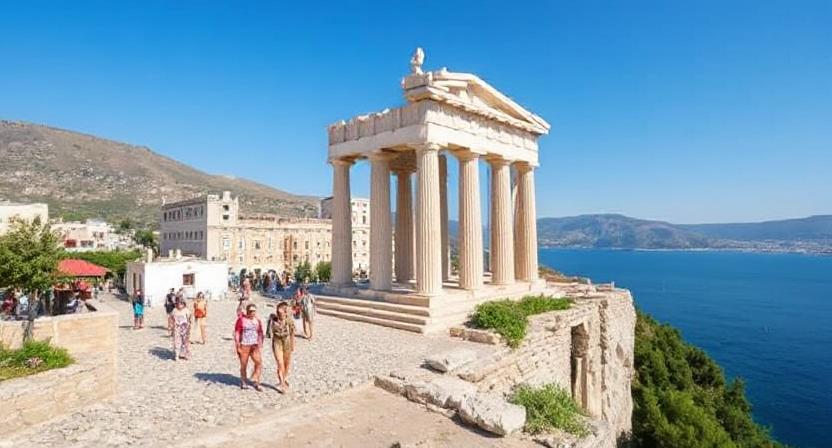Home » Greece » Greece Travel News » Italy, France, and Germany Choose Greece for Summer Holidays Boosting Record Tourism Revenue: You Need to Know
Published on
August 26, 2025
Citizens of Italy, France, and Germany were among the first international travelers flocking to Greece as their preferred European destination this summer. Tourists were drawn to the combination of the country’s sun-soaked islands, ancient landmarks, and vibrant culture. Tourists seeking both relaxation and cultural experiences were well catered to. As stated in the most recent report from Bank of Greece, the country’s tourism has increased, which in turn has resulted in high revenues, further establishing tourism as a pivotal component of the country’s economy.
In June 2025 alone, travel revenue increased by 8.8%, while the first half of the year recorded an 11% rise compared with 2024. European visitors contributed substantially, with spending from EU residents rising 5.5% to reach £1.51 billion. Non-European travelers also played a key role, with their expenditures climbing 12% to £1.21 billion. Among European visitors, tourists from Italy, France, and Germany recorded some of the highest spending increases. Italian travelers boosted their spending by 25.7%, French tourists by 19.9%, and Germans by 18.6%, highlighting Greece’s enduring appeal across these major markets. Visitors from the UK spent marginally more, with a 3% increase, while Americans led global growth with a remarkable 64.7% rise in expenditure.
Tourism revenue is now vital to Greece’s economic stability. Earnings from travel services offset 94.4% of the country’s goods trade deficit and accounted for 92.6% of total net service revenues, underscoring the sector’s indispensable role in the national economy. Local businesses, from hotels to restaurants, have benefited directly from the influx of international tourists, fueling employment and regional development.
Despite this international boom, domestic tourism remains constrained. Many Greek households are unable to afford vacations, with nearly half of the population foregoing a holiday this year. Average salaries remain low and have struggled to keep pace with inflation, limiting disposable income for leisure travel. According to European statistics, 46% of Greeks—far above the EU average—were unable to fund a one-week holiday last year. Rising accommodation costs, ferry fares, and restaurant prices have further priced many locals out of summer travel, transforming long-standing cultural traditions into luxuries beyond reach for numerous families.
This divergence between international and domestic tourism highlights a pressing economic and social contrast. While Greece’s shores teem with visitors from Italy, France, Germany, and beyond, many Greeks cannot enjoy the natural beauty, historical landmarks, and cultural heritage of their own country. Once a time-honored practice, summer vacations spanning the islands and mainland are now increasingly restricted to short breaks or entirely foregone, particularly for lower-income households.
Nevertheless, the popularity of Greece among foreign travelers remains unmatched. Italy, France, and Germany, in particular, have reaffirmed their preference for Greek destinations over other European options, drawn by the combination of Mediterranean charm, sun-drenched beaches, rich history, and vibrant gastronomy. Tourist inflows from these countries not only bolster revenue but also highlight Greece’s ability to attract high-spending visitors who seek quality experiences.
The challenge for Greece moving forward will be balancing the economic benefits of international tourism with the need to make travel accessible to its own citizens. Strengthening domestic tourism while maintaining international appeal could provide a more equitable distribution of benefits and ensure that Greek residents continue to enjoy their cultural and natural heritage alongside visitors from across Europe and the world.
Italy, Germany, and France are leading the way in the surge of tourism in Greece, which has once again solidified the country’s position as the premier tourism hub in Europe. The unique combination of sun-kissed shores, rich history, and Greek culture continues to entice travelers, making Greece a significant source of income for the country’s economy. However, the gap between booming foreign arrivals and sparse domestic travel continues to be a challenge. Striking a balance between the needs of international visitors and local residents in order to sustain Greece’s success, and preserve its culture for the future, is essential.
